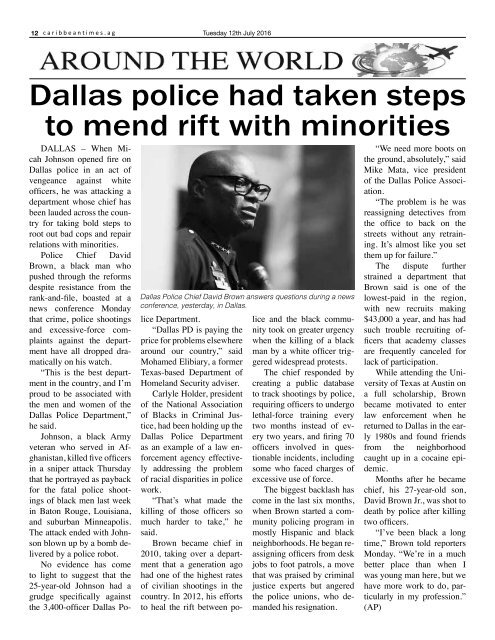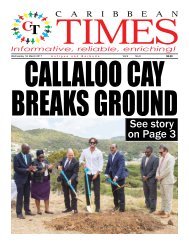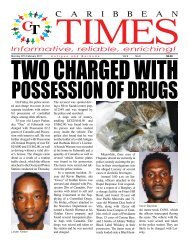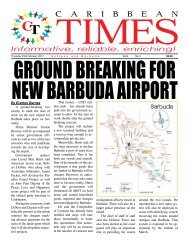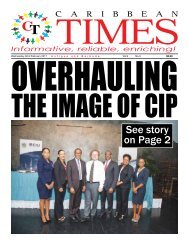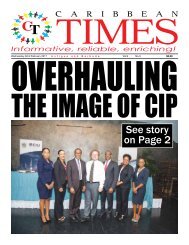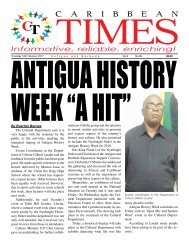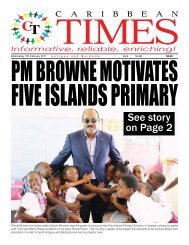Caribbean Times 49th Issue - Tuesday 12th July 2016
Caribbean Times 49th Issue - Tuesday 12th July 2016
Caribbean Times 49th Issue - Tuesday 12th July 2016
Create successful ePaper yourself
Turn your PDF publications into a flip-book with our unique Google optimized e-Paper software.
12 c a r i b b e a n t i m e s . a g<br />
<strong>Tuesday</strong> <strong>12th</strong> <strong>July</strong> <strong>2016</strong><br />
Dallas police had taken steps<br />
to mend rift with minorities<br />
Dallas Police Chief David Brown answers questions during a news<br />
conference, yesterday, in Dallas.<br />
DALLAS – When Micah<br />
Johnson opened fire on<br />
Dallas police in an act of<br />
vengeance against white<br />
officers, he was attacking a<br />
department whose chief has<br />
been lauded across the country<br />
for taking bold steps to<br />
root out bad cops and repair<br />
relations with minorities.<br />
Police Chief David<br />
Brown, a black man who<br />
pushed through the reforms<br />
despite resistance from the<br />
rank-and-file, boasted at a<br />
news conference Monday<br />
that crime, police shootings<br />
and excessive-force complaints<br />
against the department<br />
have all dropped dramatically<br />
on his watch.<br />
“This is the best department<br />
in the country, and I’m<br />
proud to be associated with<br />
the men and women of the<br />
Dallas Police Department,”<br />
he said.<br />
Johnson, a black Army<br />
veteran who served in Afghanistan,<br />
killed five officers<br />
in a sniper attack Thursday<br />
that he portrayed as payback<br />
for the fatal police shootings<br />
of black men last week<br />
in Baton Rouge, Louisiana,<br />
and suburban Minneapolis.<br />
The attack ended with Johnson<br />
blown up by a bomb delivered<br />
by a police robot.<br />
No evidence has come<br />
to light to suggest that the<br />
25-year-old Johnson had a<br />
grudge specifically against<br />
the 3,400-officer Dallas Police<br />
Department.<br />
“Dallas PD is paying the<br />
price for problems elsewhere<br />
around our country,” said<br />
Mohamed Elibiary, a former<br />
Texas-based Department of<br />
Homeland Security adviser.<br />
Carlyle Holder, president<br />
of the National Association<br />
of Blacks in Criminal Justice,<br />
had been holding up the<br />
Dallas Police Department<br />
as an example of a law enforcement<br />
agency effectively<br />
addressing the problem<br />
of racial disparities in police<br />
work.<br />
“That’s what made the<br />
killing of those officers so<br />
much harder to take,” he<br />
said.<br />
Brown became chief in<br />
2010, taking over a department<br />
that a generation ago<br />
had one of the highest rates<br />
of civilian shootings in the<br />
country. In 2012, his efforts<br />
to heal the rift between police<br />
and the black community<br />
took on greater urgency<br />
when the killing of a black<br />
man by a white officer triggered<br />
widespread protests.<br />
The chief responded by<br />
creating a public database<br />
to track shootings by police,<br />
requiring officers to undergo<br />
lethal-force training every<br />
two months instead of every<br />
two years, and firing 70<br />
officers involved in questionable<br />
incidents, including<br />
some who faced charges of<br />
excessive use of force.<br />
The biggest backlash has<br />
come in the last six months,<br />
when Brown started a community<br />
policing program in<br />
mostly Hispanic and black<br />
neighborhoods. He began reassigning<br />
officers from desk<br />
jobs to foot patrols, a move<br />
that was praised by criminal<br />
justice experts but angered<br />
the police unions, who demanded<br />
his resignation.<br />
“We need more boots on<br />
the ground, absolutely,” said<br />
Mike Mata, vice president<br />
of the Dallas Police Association.<br />
“The problem is he was<br />
reassigning detectives from<br />
the office to back on the<br />
streets without any retraining.<br />
It’s almost like you set<br />
them up for failure.”<br />
The dispute further<br />
strained a department that<br />
Brown said is one of the<br />
lowest-paid in the region,<br />
with new recruits making<br />
$43,000 a year, and has had<br />
such trouble recruiting officers<br />
that academy classes<br />
are frequently canceled for<br />
lack of participation.<br />
While attending the University<br />
of Texas at Austin on<br />
a full scholarship, Brown<br />
became motivated to enter<br />
law enforcement when he<br />
returned to Dallas in the early<br />
1980s and found friends<br />
from the neighborhood<br />
caught up in a cocaine epidemic.<br />
Months after he became<br />
chief, his 27-year-old son,<br />
David Brown Jr., was shot to<br />
death by police after killing<br />
two officers.<br />
“I’ve been black a long<br />
time,” Brown told reporters<br />
Monday. “We’re in a much<br />
better place than when I<br />
was young man here, but we<br />
have more work to do, particularly<br />
in my profession.”<br />
(AP)


